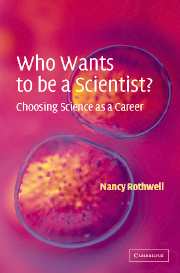Book contents
- Frontmatter
- Contents
- Preface
- 1 Introduction
- 2 Starting out in research
- 3 Getting down to research
- 4 Scientific ethics and conduct
- 5 Publish or perish?
- 6 Communication and getting known
- 7 Moving up
- 8 Responsibilities
- 9 Funding research
- 10 Who owns science?
- 11 Science and the public
- 12 Power, pressure and politics
- 13 Social aspects of science
- 14 So who does want to be a scientist?
- Index
3 - Getting down to research
Published online by Cambridge University Press: 06 July 2010
- Frontmatter
- Contents
- Preface
- 1 Introduction
- 2 Starting out in research
- 3 Getting down to research
- 4 Scientific ethics and conduct
- 5 Publish or perish?
- 6 Communication and getting known
- 7 Moving up
- 8 Responsibilities
- 9 Funding research
- 10 Who owns science?
- 11 Science and the public
- 12 Power, pressure and politics
- 13 Social aspects of science
- 14 So who does want to be a scientist?
- Index
Summary
It is psychologically important to get results, even if they are not original.
The early phase of research can be somewhat bewildering and varies considerably between countries, institutions and labs. In some institutions, the first year or so is spent on taught courses, with only short lab projects, to be followed by a gradual introduction to the research project. At the other extreme, the student is launched into their own research project on day 1 and expected to produce some results by day 3. Both approaches are valid, have benefits and disadvantages, and each poses challenges and frustrations. For any new research project there always seems to be too much to take in at once: new colleagues, new techniques, numerous papers to read – most of which seem unintelligible or at best irrelevant – talks to attend and, most importantly, results to obtain. There is so much to do and learn, but as soon as you are in the lab, try to do an experiment.
LIFE IN THE LAB
The lab is not just a physical structure, but also a group of people each acting and interacting in different and specific ways. No two lab structures are identical because they are determined by the personalities and activities of the staff, the size of the lab (people, funding and space), the type of work being undertaken and the style of the lab head. You need to know about the physical structure, the individuals, what they do, i.e. ‘how the lab works’.
- Type
- Chapter
- Information
- Who Wants to be a Scientist?Choosing Science as a Career, pp. 11 - 28Publisher: Cambridge University PressPrint publication year: 2002



